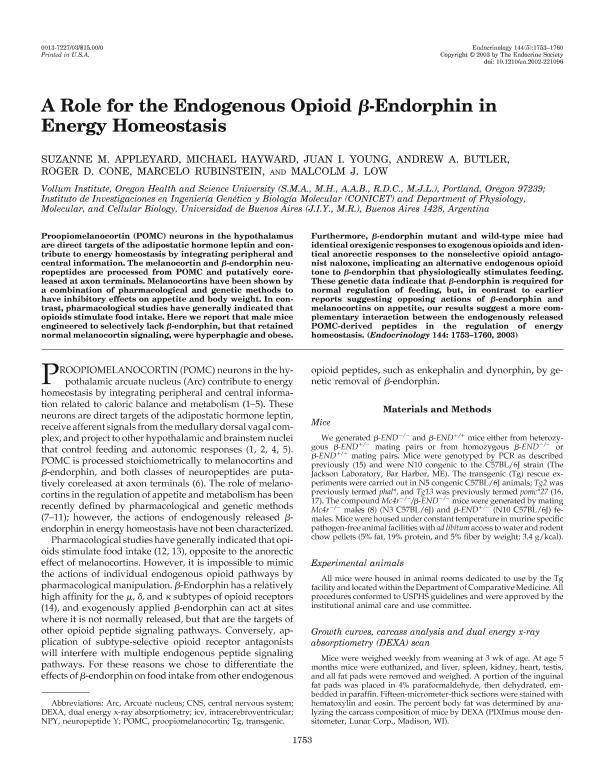Artículo
A role for the endogenous opioid β-endorphin in energy homeostasis
Appleyard, Suzanne M.; Hayward, Michael; Young, Juan I.; Butler, Andrew A.; Cone, Roger D.; Rubinstein, Marcelo ; Low, Malcolm J.
; Low, Malcolm J.
 ; Low, Malcolm J.
; Low, Malcolm J.
Fecha de publicación:
05/2003
Editorial:
Endocrine Society
Revista:
Endocrinology
ISSN:
0013-7227
Idioma:
Inglés
Tipo de recurso:
Artículo publicado
Clasificación temática:
Resumen
Proopiomelanocortin (POMC) neurons in the hypothalamus are direct targets of the adipostatic hormone leptin and contribute to energy homeostasis by integrating peripheral and central information. The melanocortin and β-endorphin neuropeptides are processed from POMC and putatively coreleased at axon terminals. Melanocortins have been shown by a combination of pharmacological and genetic methods to have inhibitory effects on appetite and body weight. In contrast, pharmacological studies have generally indicated that opioids stimulate food intake. Here we report that male mice engineered to selectively lack β-endorphin, but that retained normal melanocortin signaling, were hyperphagic and obese. Furthermore, β-endorphin mutant and wild-type mice had identical orexigenic responses to exogenous opioids and identical anorectic responses to the nonselective opioid antagonist naloxone, implicating an alternative endogenous opioid tone to β-endorphin that physiologically stimulates feeding. These genetic data indicate that β-endorphin is required for normal regulation of feeding, but, in contrast to earlier reports suggesting opposing actions of β-endorphin and melanocortins on appetite, our results suggest a more complementary interaction between the endogenously released POMC-derived peptides in the regulation of energy homeostasis.
Palabras clave:
Endorfinas
,
Obesidad
Archivos asociados
Licencia
Identificadores
Colecciones
Articulos(INGEBI)
Articulos de INST.DE INVEST.EN ING.GENETICA Y BIOL.MOLECULAR "DR. HECTOR N TORRES"
Articulos de INST.DE INVEST.EN ING.GENETICA Y BIOL.MOLECULAR "DR. HECTOR N TORRES"
Citación
Appleyard, Suzanne M.; Hayward, Michael; Young, Juan I.; Butler, Andrew A.; Cone, Roger D.; et al.; A role for the endogenous opioid β-endorphin in energy homeostasis; Endocrine Society; Endocrinology; 144; 5; 5-2003; 1753-1760
Compartir
Altmétricas



